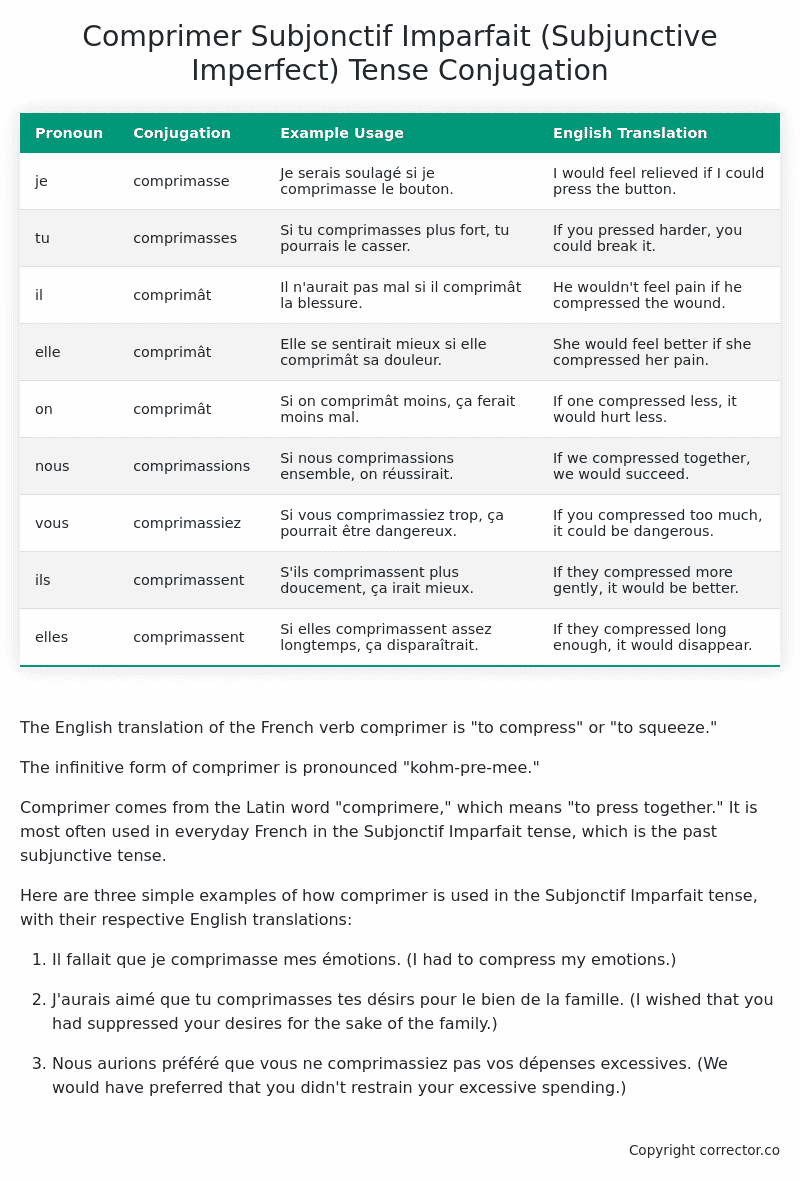Subjonctif Imparfait (Subjunctive Imperfect) Tense Conjugation of the French Verb comprimer
Introduction to the verb comprimer
The English translation of the French verb comprimer is “to compress” or “to squeeze.”
The infinitive form of comprimer is pronounced “kohm-pre-mee.”
Comprimer comes from the Latin word “comprimere,” which means “to press together.” It is most often used in everyday French in the Subjonctif Imparfait tense, which is the past subjunctive tense.
Here are three simple examples of how comprimer is used in the Subjonctif Imparfait tense, with their respective English translations:
-
Il fallait que je comprimasse mes émotions. (I had to compress my emotions.)
-
J’aurais aimé que tu comprimasses tes désirs pour le bien de la famille. (I wished that you had suppressed your desires for the sake of the family.)
-
Nous aurions préféré que vous ne comprimassiez pas vos dépenses excessives. (We would have preferred that you didn’t restrain your excessive spending.)
Table of the Subjonctif Imparfait (Subjunctive Imperfect) Tense Conjugation of comprimer
| Pronoun | Conjugation | Example Usage | English Translation |
|---|---|---|---|
| je | comprimasse | Je serais soulagé si je comprimasse le bouton. | I would feel relieved if I could press the button. |
| tu | comprimasses | Si tu comprimasses plus fort, tu pourrais le casser. | If you pressed harder, you could break it. |
| il | comprimât | Il n’aurait pas mal si il comprimât la blessure. | He wouldn’t feel pain if he compressed the wound. |
| elle | comprimât | Elle se sentirait mieux si elle comprimât sa douleur. | She would feel better if she compressed her pain. |
| on | comprimât | Si on comprimât moins, ça ferait moins mal. | If one compressed less, it would hurt less. |
| nous | comprimassions | Si nous comprimassions ensemble, on réussirait. | If we compressed together, we would succeed. |
| vous | comprimassiez | Si vous comprimassiez trop, ça pourrait être dangereux. | If you compressed too much, it could be dangerous. |
| ils | comprimassent | S’ils comprimassent plus doucement, ça irait mieux. | If they compressed more gently, it would be better. |
| elles | comprimassent | Si elles comprimassent assez longtemps, ça disparaîtrait. | If they compressed long enough, it would disappear. |
Other Conjugations for Comprimer.
Le Present (Present Tense) Conjugation of the French Verb comprimer
Imparfait (Imperfect) Tense Conjugation of the French Verb comprimer
Passé Simple (Simple Past) Tense Conjugation of the French Verb comprimer
Passé Composé (Present Perfect) Tense Conjugation of the French Verb comprimer
Futur Simple (Simple Future) Tense Conjugation of the French Verb comprimer
Futur Proche (Near Future) Tense Conjugation of the French Verb comprimer
Plus-que-parfait (Pluperfect) Tense Conjugation of the French Verb comprimer
Passé Antérieur (Past Anterior) Tense Conjugation of the French Verb comprimer
Futur Antérieur (Future Anterior) Tense Conjugation of the French Verb comprimer
Subjonctif Présent (Subjunctive Present) Tense Conjugation of the French Verb comprimer
Subjonctif Passé (Subjunctive Past) Tense Conjugation of the French Verb comprimer
Subjonctif Imparfait (Subjunctive Imperfect) Tense Conjugation of the French Verb comprimer (this article)
Subjonctif Plus-que-parfait (Subjunctive Pluperfect) Tense Conjugation of the French Verb comprimer
Conditionnel Présent (Conditional Present) Tense Conjugation of the French Verb comprimer
Conditionnel Passé (Conditional Past) Tense Conjugation of the French Verb comprimer
L’impératif Présent (Imperative Present) Tense Conjugation of the French Verb comprimer
L’infinitif Présent (Infinitive Present) Tense Conjugation of the French Verb comprimer
Struggling with French verbs or the language in general? Why not use our free French Grammar Checker – no registration required!
Get a FREE Download Study Sheet of this Conjugation 🔥
Simply right click the image below, click “save image” and get your free reference for the comprimer Subjonctif Imparfait tense conjugation!

Comprimer – About the French Subjonctif Imparfait (Subjunctive Imperfect) Tense
Formation
Common Everyday Usage Patterns
Interactions with Other Tenses
Subjonctif Présent
Indicatif Passé Composé
Conditional
Conditional Perfect
Summary
I hope you enjoyed this article on the verb comprimer. Still in a learning mood? Check out another TOTALLY random French verb conjugation!


